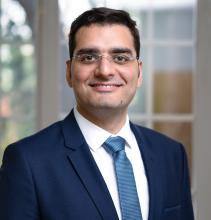The Department of Economics is excited to welcome Dr. Ali Karimirad, who will be joining us in Fall 2024 as a new Faculty member. We invite you to get to know him through his bio and Q&A below and warmly welcome him when you see him on campus!
Bio
Dr. Ali Karimirad joins the University of Washington's Department of Economics with a fresh perspective on macroeconomic and financial economics. Having recently completed his Ph.D. from the University of British Columbia, Ali's research primarily focuses on firm dynamics within input-output economies, exploring how interactions between firms shape broader economic outcomes.
Ali's approach to teaching seeks to bridge macroeconomic theory with empirical findings, emphasizing real-life applications that resonate with students. His recent experience working in local government has reinforced his belief in the value of applying economic theories to develop quantitative models for policy recommendations.
With a background that spans both academia and public sector work, Ali brings a unique blend of theoretical knowledge and practical experience to the department. He is passionate about exploring the intricate connections within economic systems and is dedicated to helping students understand the real-world implications of economic principles.
Ali looks forward to contributing to the department's research initiatives, engaging with students, and collaborating with colleagues to advance our understanding of complex economic phenomena.
Q & A with Ali Karimirad, Ph.D.
What drew you to the field of economics?
“My journey to economics was sparked by a fascination with modeling human behavior. After completing my bachelor's in Electrical Engineering, I was drawn to economics because of its ability to address questions that directly impact people's daily lives and society's well-being. The power of economic analysis to influence real-world outcomes and policy decisions was particularly compelling to me.”
What are your primary research interests, and why are they important to you?
“My primary research interests lie in macroeconomics and financial economics. What fascinates me most is how macroeconomic behavior doesn't necessarily arise from a simple aggregation of individual behaviors. Optimal decisions at the individual level can differ from optimal aggregate decisions, creating intriguing dynamics. Externalities are a prime example of this deviation, opening up possibilities for meaningful interventions. Understanding these complexities is crucial for designing effective policies and improving economic outcomes.”
How do you spend your time outside of work? Any hobbies or interests?
“Hiking is the only sport I've ever truly enjoyed, and camping is my favorite hobby. There's something uniquely refreshing about being in nature, away from the complexities of economic models and data analysis. These activities not only provide physical exercise but also offer a mental reset, often inspiring new perspectives on my research. The problem-solving skills required in navigating trails or setting up camp in diverse environments have surprising parallels to tackling complex economic questions.”
Is there a particular economist or thinker who has influenced your work, and if so, how?
“Robert Lucas Jr. has had a profound influence on my perspective and understanding of economics. As a young graduate student, I found his writing style, method of explanation, and ability to simplify complex concepts incredibly influential. Lucas's work on rational expectations and macroeconomic modeling not only shaped my research interests but also influenced my approach to teaching. His ability to bridge theory and empirical work continues to inspire my own efforts to make economics accessible and relevant to students and policymakers alike.”
What is a recent project or paper you've worked on that you're particularly proud of?
“The recent work that excites me the most demonstrates how the possibility of default on trade credit leads to pecuniary externalities in the credit market. This research shows how these externalities can result in a misallocation of resources, leading to the overproduction of intermediate inputs and the underproduction of consumer goods. I'm proud of this work because it highlights the subtle yet significant ways in which financial frictions can impact the broader economy, potentially informing policy decisions in credit markets.”
